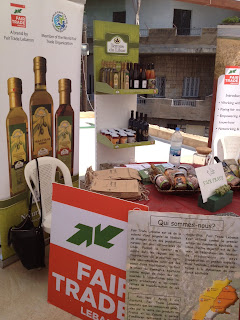[texte français ci-dessous]
Fair Trade Lebanon and Terroirs du Liban (TDL) have launched a collaboration with
Carrefour supermarket, located in Hazmieh, in the capital of Beirut, through
the animation of a live Saj station (traditional Lebanese bread, served with
cheese, zaatar and other fillings) while also selling the whole range of TDL
products.
The Saj stand is located next to Carrefour’s bakery and is
animated by cooperatives’ women who underwent the food training sessions
offered within the UN Women project.
Through this collaboration and within the framework of the
“Placement Program” of the project, these women were hired by Fair Trade and
Tourism Lebanon (FTTL) to put into practice their knowledge and further develop
their expertise.
Live saj preparation hours are from 9 AM until 8 PM,
throughout the week.
This collaboration will last until the end of December 2016 with a chance of extension.
This collaboration will last until the end of December 2016 with a chance of extension.
Support this great development initiative and make sure to
pass by and taste their exquisite Saj preparations!
* * * * *
Fair Trade Lebanon et Terroirs du Liban (TDL) ont lancé une collaboration avec le supermarché Carrefour, situé à Hazmieh, dans la capitale de Beyrouth, et ce en animant un stand de préparation sur place de Saj (pain libanais traditionnel, servi avec du fromage, du zaatar et autres garnitures) ainsi qu’en proposant à la vente la gamme entière des produits TDL.
Le stand de Saj est situé à côté de la boulangerie de Carrefour ; Il est animé par les femmes des coopératives ayant participées aux sessions de formations culinaires offertes au sein du projet UN WOMEN.
Grace à cette collaboration et toujours dans le cadre du projet, elles ont été embauchées par Fair Trade and Tourism Lebanon (FTTL) en tant que stagiaires dans le but de leur offrir un débouché de travail, de mettre en pratique leurs connaissances et de développer leur expertise.
Le stand de Saj est situé à côté de la boulangerie de Carrefour ; Il est animé par les femmes des coopératives ayant participées aux sessions de formations culinaires offertes au sein du projet UN WOMEN.
Grace à cette collaboration et toujours dans le cadre du projet, elles ont été embauchées par Fair Trade and Tourism Lebanon (FTTL) en tant que stagiaires dans le but de leur offrir un débouché de travail, de mettre en pratique leurs connaissances et de développer leur expertise.
Les horaires de préparation de Saj sont de 9h à 20h, courant toute la semaine.
Cette collaboration aura lieu jusqu’à la fin du mois de Décembre 2016 avec une chance de prolongation.
Soutenez cette belle initiative de développement et ne manquez pas de passer pour déguster leur préparation exquise de Saj !
Cette collaboration aura lieu jusqu’à la fin du mois de Décembre 2016 avec une chance de prolongation.
Soutenez cette belle initiative de développement et ne manquez pas de passer pour déguster leur préparation exquise de Saj !










































